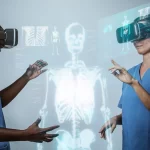
Research Methods for Adequate Data Collection from Patient Records
March 26, 2022
Design and Implementation of 3D Web Based Interactive Medical Devices
April 1, 2022In brief
Despite the current abundance of data and information, the healthcare industry needs actionable knowledge. Electronic record management, data integration, computer-aided diagnosis, and illness predictions are areas where the healthcare business faces issues. Reduced healthcare expenditures and a shift toward individualised treatment are both necessary. Deep learning and predictive analytics, which are fast increasing domains, have begun to play a vital role in creating enormous volumes of healthcare data practises and research. Deep learning provides various tools, methodologies, and frameworks to solve these issues. Predictive analytics for health data is gathering steam as a game-changing technology that can enable more preventive treatment choices. In a nutshell, the framework for deep learning data emphasises this research.
Introduction
Given the enormous expense of delayed diagnosis and treatment, healthcare is an area where prediction may be more essential than explanation. Prior information systems (IS) research has frequently emphasised the benefits of predictive analytics in healthcare. In the healthcare business, the digitalisation of healthcare results in the generation of enormous new data sets. Computerised physician order entries, physicians’ notes, and imaging devices, to mention a few, are also potential sources of clinical data. Compared to other industries, these datasets are exceptionally complicated and fragmented, presenting significant diagnoses, treatment, and prevention challenges, and their improvement represents immeasurable value.
Predictive analytics services helps healthcare life sciences and providers by utilising various approaches such as data mining, statistics, modelling, machine learning, and artificial intelligence to explore current results and generate future predictions. It assists healthcare organisations in preparing for health care by lowering costs, correctly detecting illnesses, improving patient care, maximising resources, and improving clinical results. Deep learning is a technique for automatically identifying patterns and extracting features from complex unstructured data without human intervention, making it a crucial tool in big data research. In diagnostic applications, deep learning plays an important role.
Deep Learning Predictive Analytics Survey in Health Care
Healthcare predictive analytics service provider aims to predict future health-related outcomes or occurrences using clinical and nonclinical patterns in data. Deep learning applications in pharmaceutical research have evolved in recent years. They have shown promise in addressing various difficulties in drug discovery by assessing the patient’s medical history and providing the appropriate therapy for the patients based on their symptoms and tests. In healthcare predictive analytics, study outcomes such as medical problems, hospital readmissions, therapy responses, and patient death are frequently of enormous practical value. The current trend for deep learning in healthcare data analysis demonstrates its importance.
Deep Learning Models
The feature engineering process involves domain expertise and is time-consuming, the primary distinction between classical machine learning and deep learning methods. Deep learning techniques use predictive analytics solutions automatic feature engineering, whereas typical machine learning algorithms need us to create the features.
In medical applications, the commonly used deep learning algorithms include
• Convolution neural network (CNN)
• Recurrent neural network (RNN)
• Deep belief network (DBN)
• Deep neural network (DNN)
• Generative Adversarial Network (GAN)
Convolution neural network (CNN): CNN was the first approach for high-dimensional image analysis to be suggested and used. It comprises convolutional filters that turn 2D into 3D.
Recurrent neural network (RNN): It’s a neural net design that can learn sequences and handle temporal dependencies and features recurrent connections between hidden states. The recurrent connections are utilised to detect correlations across time and between inputs. As a result, it is particularly matched to health challenges that frequently entail modelling changes in clinical data over time.
Deep belief network (DBN): This model has a unidirectional link between two levels on the top of layers. Each sub-hidden network’s layers serve as a visible layer for the following.
Deep neural network (DNN): It contains several levels, allowing for a complicated non-linear interaction.
Generative Adversarial Network (GAN): In the training phase, the GAN architecture consists of a generator and a discriminator. GAN is a popular tool for creating realistic graphics.

Figure: Deep learning data analysis to clinical decision making
Future trends of Deep Learning in Healthcare Predictions
Since the beginning of digital imaging, deep learning techniques have been used in medical imaging. Google DeepMind Health collaborates with the UK’s National Health Service to process more patient medical data. The acquisition of Merge’s medical management platform by IBM Watson recently bolstered the company’s billion-dollar entry into the imaging field. The lack of a dataset, specialised medical professionals, nonstandard data machine learning techniques, privacy, and legal difficulties are all obstacles.
Conclusion
In a summary of deep learning research related to healthcare data predictive analysis in this paper, to employ deep learning in healthcare. The main goal of this research is to develop a framework for utilising DL with predictive analysis to monitor healthcare data. Here, a significant region with much potential for medical imaging is getting much attention in unsupervised learning.
References
- Agarwal, R., Dhar, V.: Big data, data science, and analytics: the opportunity and challenge for IS research. Inf. Syst. Res. 25(3), 443–448 (2014)
- Bardhan, I., Oh, J., Zheng, Z., Kirksey, K.: Predictive analytics for readmission of patients with congestive heart failure. Inf. Systems. Res. 26(1), 19–39 (2014)
- Muniasamy, Anandhavalli, et al. “Deep learning for predictive analytics in healthcare.” International Conference on Advanced Machine Learning Technologies and Applications. Springer, Cham, 2019.
